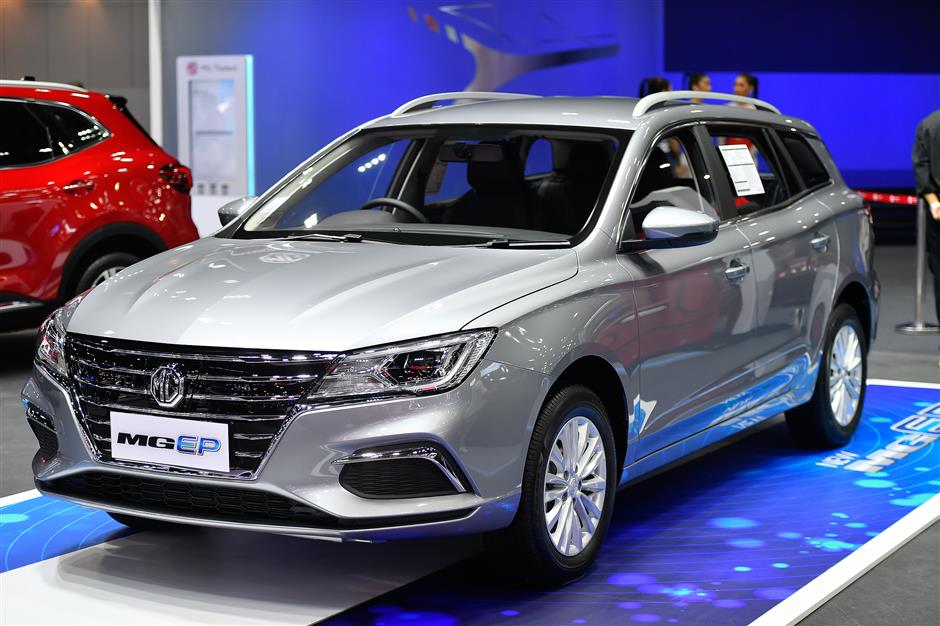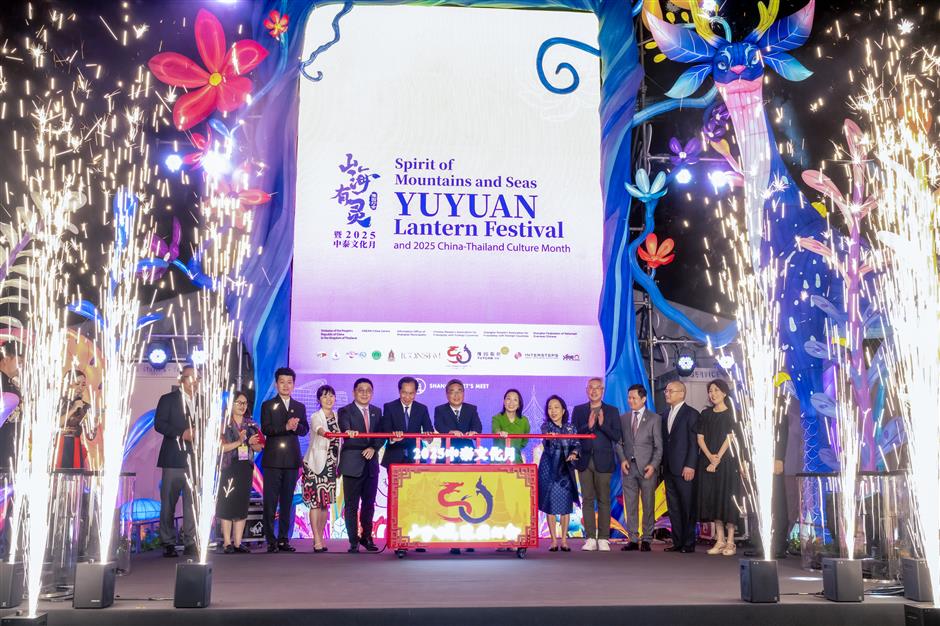Shanghai Today
Shanghai's pivotal role in 50-year Sino-Thai friendship - July 02, 2025
上海在中泰友谊50年中的关键作用
As China and Thailand marked the 50th anniversary of diplomatic relations on July 1, a review of the vicissitudes the two countries have witnessed over the five decades, from cautious Cold War-era contacts to the setting up of a comprehensive strategic cooperative partnership, would present a prime example of amicable coexistence between nations with differing social systems.
The city of Shanghai, as a gateway to reforms and globalization, has played a uniquely pivotal role in linking the two countries in political, economic and cultural exchanges.
Looking back, the establishment of the diplomatic ties was a testament to vision and courage.
In 1956, eminent Thai statesman Sang Pathanothai sent his children, Chang Yuan (Sirin Phathanothai) and Chang Huai (Warin Phathanothai), to China under Premier Zhou Enlai's personal care, sowing seeds of friendship long before formal ties were established on July 1, 1975, when then Thai Prime Minister Kukrit Pramoj and Premier Zhou signed the Joint Communiqué in Beijing.
Shanghai was a pivotal gateway for Thai businesses entering China in the late 1970s. After Charoen Pokphand Group (CP Group) launched China's first foreign-funded enterprise in Shenzhen in 1979, the group soon expanded to Shanghai, signalling extensive Thai investments in China.
Such people-to-people economic engagement laid a solid foundation for ensuing comprehensive bilateral cooperation.
Shanghai's role in enhancing mutual economic ties cannot be overstated, particularly in the 21st century, when the city serves as a critical hub for conducting business.
Last year, bilateral trade reached US$133.98 billion, with China sustaining its position as Thailand's largest trading partner for years. Significantly, 30 percent of Thailand's fruit exports to China entered through Shanghai.
The city also shines in cross-border investment. CP Group has established some of the city's most recognizable landmarks, including Shanghai's Super Brand Mall and Lotus Supercenter. Meanwhile, SAIC Motor's production base in Thailand consistently holds a top-three market share there.

An MG EP electric vehicle is displayed during the Thailand International Motor Expo 2022.
Such two-way investment not only drives economic growth but also deepens industrial integration.
Deserving of special attention is the Bangkok-Shanghai Economic Forum, launched in 2018, which has become a major platform for economic collaboration.
The 4th forum, themed "Synergizing Green Economic Development," saught to align Thailand's Bio-Circular-Green (BCG) economy model with the Yangtze River Delta's high-quality development, affording new paradigms for innovative solutions for regional sustainability.
Also pivotal to future collaboration is partnership in scientific and technological innovation.
December 2023 saw the launch of the CAS Bangkok Innovation Cooperation Center, marking the Chinese Academy of Sciences' first overseas institution focused on commercial use of technology, with particular focus on agriculture, biotechnology and new energy.
Some research institutions from Shanghai have been actively involved, specifically in driving alignment of BRI-driven innovation with Thailand's Industry 4.0 strategy.
Deepening cooperation is also evidenced in the digital economy, AI and biopharmaceuticals, with synergies forming between Shanghai's Zhangjiang Science City and Thailand's Eastern Economic Corridor (EEC).
As an international metropolis, Shanghai is also a major platform in facilitating cultural exchange and people-to-people bonding.
For instance, the annual Thai Cultural Festival attracts hundreds of thousands of visitors, with Muay Thai demonstrations and food festivals regularly held in commercial hubs like the Jing'an Kerry Center. Similarly, the China Cultural Center in Bangkok also regularly showcases Shanghai's intangible cultural heritage, such as the Shanghai-style paper-cutting, and Shanghai opera.

Officials jointly launch the Yuyuan lantern festival in Bangkok to celebrate 50 years of diplomatic relations between China and Thailand.
All-round cooperation has led to robust exchanges in education.
The Network of ASEAN-China Academic Institutes (NACAI), founded by Center for China's Relations with Neighboring Countries (CCRNC), Fudan University, in 2017, with Chulalongkorn University as a founding member, has facilitated scholarly exchanges between ASEAN countries and China.
Building on this platform, the China-ASEAN Scholars Dialogue was launched in 2023 to institutionalize academic collaboration, creating a regular platform for exchanges between China and Thai scholars.
Fudan University also hosts a significant number of Thai students, sustaining its role as a key education base.
Shanghai and Bangkok also exemplify international knowledge-sharing and mutual-learning cooperation in urban governance.
For instance, Bangkok has adopted Shanghai's subway dispatching system to alleviate traffic congestion and leveraged the "One-Stop Service Platform" model to advance its Smart Bangkok 2025 initiative.
Similarly, Shanghai is studying Bangkok's water bus system to better exploit urban river transport. Both cities also collaborate, within the C40, a global network of the world's leading cities that are united in action to confront the climate crisis, on flood mitigation and air quality improvement.
The 2019 Memorandum of Understanding between Shanghai and Bangkok provides for regular exchange mechanisms. In 2023, Bangkok Mayor Chadchart Sittipunt and Shanghai Mayor Gong Zheng agreed to form a joint task force to address shared challenges like PM2.5 pollution, setting an example for subnational cooperation.
New opportunities
At the 50th anniversary milestone, China-Thailand relations face new opportunities. With the full implementation of RCEP and deepening BRI initiatives, cooperation between Shanghai and Thailand will be expected in three key directions:
Accelerated green transition: Given high alignment between Thailand's BCG model and Shanghai's green development concept, the two sides would deepen cooperation in new energy vehicles, clean energy, and the circular economy.
Digital economy as a new driver: Shanghai's strengths in AI and big data, combined with Thailand's digitalization strategy, could spawn innovative growth sectors.
Closer regional linkages: Synergies between the Yangtze River Delta city cluster and Thailand's Gulf of Thailand Economic Zone may reshape regional cooperation.
From the "friendship envoys" in Chang Yuan and Chang Huai to today's multi-layered collaboration, China-Thailand relations have gone through an extraordinary journey over the five decades.
As a witness and participant to the process, and a catalyst for further cooperation, Shanghai will continue to play a significant role.
As Princess Maha Chakri Sirindhorn once noted: "China-Thailand friendship flows like the Chao Phraya and Yangtze rivers."
Guided by the vision of a shared future for humanity, the bilateral relationship is poised for an even brighter tomorrow.
Source: Shanghai Daily

